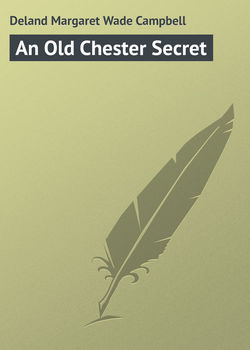Читать книгу An Old Chester Secret - Deland Margaret Wade Campbell - Страница 2
CHAPTER II
ОглавлениеDURING the first year that the "Smith" baby lived outside the brick wall of Mr. Smith's place, the iron gates of the driveway were not opened, because business obliged Mr. Smith to be in Europe. (Oh, said Old Chester, so that was why Mary's wedding had to be hurried up?) When he returned to his native land he never, as he drove past, looked at the youngster playing in Miss Lydia's dooryard. Then once Johnny (he was three years old) ran after his ball almost under the feet of the Smith horses, and as he was pulled from between the wheels his grandfather couldn't help seeing him.
"Don't do that tomfool thing again!" the old man shouted, and Johnny, clasping his recovered ball, grinned at him.
"He sinks Johnny 'f'aid," the little fellow told Miss Lydia.
A month or two afterward Johnny threw a stone at the victoria and involuntarily Mr. Smith glanced in the direction from which it came. But, of course, human nature being like story books, he did finally notice his grandson. At intervals he spoke to Miss Lydia, and when Johnny was six years old he even stopped one day long enough to give the child a quarter. Mr. Smith had aged very much after his daughter's marriage – and no wonder, Old Chester said, for he must be lonely in that big house, and Mary never coming to see him! Such behavior on the part of a daughter puzzled Old Chester. We couldn't understand it – unless it was that Mr. Smith didn't get along with his son-in-law? And Mary, of course, didn't visit her father because a dutiful wife always agrees with her husband! A sentiment which places Old Chester chronologically.
The day that Mr. Smith bestowed the quarter upon his grandson he spoke of his daughter's "dutifulness" to Miss Lydia. Driving toward his house, he overtook two trudging figures, passed them by a rod or two, then called to the coachman to stop. "I'll walk," he said, briefly, and waited, in the dust of his receding carriage until Miss Lydia and her boy reached him. Johnny was trudging along, pulling his express wagon, which was full of apples picked up on the path below an apple tree that leaned over the girdling wall of the Smith place.
As Miss Lydia approached her landlord her heart came up in her throat; it always did when she saw him, because she remembered the Olympian thunders he had loosed on that awful night six years ago.
"How do?" said Mr. Smith. His dark eyes under bristling, snow-white eyebrows blazed at her. He didn't notice the little boy.
"How do you do?" said Miss Lydia, in a small voice. She looked tousled and breathless and rather spotted, and so little that Mr. Smith must have felt he could blow her away if he wanted to. Apparently he didn't want to. He only said:
"You – ah, never hear from – ah, my daughter, I suppose, Miss Sampson?"
"No, sir," said Miss Lydia.
"She doesn't care to visit me without her husband, and I won't have him under my roof!" His lip lifted for an instant and showed his teeth. "I see her when I go to Philadelphia, and she writes me duty letters occasionally, but she never mentions – "
"Doesn't she?" said Miss Lydia.
"I don't, either. But I just want to say that if you ever need any – ah, extra – "
"I don't, thank you."
Then, reluctantly, the flashing black eyes looked down at Johnny. "Doesn't resemble – anybody? Well, young man!"
"Say, 'How do you do?' Johnny," Miss Lydia commanded, faintly.
"How do?" Johnny said, impatiently. He was looking over his apples and, discovering some bruised ones, frowned and threw them away.
"Where did you get your apples?" said Mr. Smith.
"On the road," said Johnny; "they ain't yours when they drop on the road."
"Say 'aren't,' Johnny," said Miss Lydia. "It isn't nice to say 'ain't.'"
"Why aren't they mine?" said the old man. He was towering up above the two little figures, his feet wide apart, his hands behind him, switching his cane back and forth like a tail.
"'Cause I've got 'em," Johnny explained, briefly.
